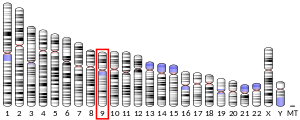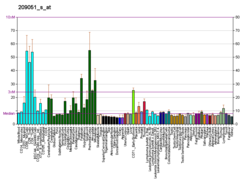Ral guanine nucleotide dissociation stimulator is a protein that is encoded by the RALGDS gene in humans.[5] [6]
Interactions
edit
References
edit
^ a b c GRCh38: Ensembl release 89: ENSG00000160271 – Ensembl , May 2017^ a b c GRCm38: Ensembl release 89: ENSMUSG00000026821 – Ensembl , May 2017^ "Human PubMed Reference:" . National Center for Biotechnology Information, U.S. National Library of Medicine .^ "Mouse PubMed Reference:" . National Center for Biotechnology Information, U.S. National Library of Medicine .^ a b Hofer F, Fields S, Schneider C, Martin GS (December 1994). "Activated Ras interacts with the Ral guanine nucleotide dissociation stimulator" . Proc Natl Acad Sci U S A . 91 (23): 11089–93. Bibcode :1994PNAS...9111089H . doi :10.1073/pnas.91.23.11089 PMC 45172 PMID 7972015 . ^ "Entrez Gene: RALGDS ral guanine nucleotide dissociation stimulator" .^ a b Bhattacharya M, Anborgh PH, Babwah AV, Dale LB, Dobransky T, Benovic JL, Feldman RD, Verdi JM, Rylett RJ, Ferguson SS (August 2002). "Beta-arrestins regulate a Ral-GDS Ral effector pathway that mediates cytoskeletal reorganization". Nat. Cell Biol . 4 (8): 547–55. doi :10.1038/ncb821 . PMID 12105416 . S2CID 20784208 . ^ a b c d Spaargaren M, Bischoff JR (December 1994). "Identification of the guanine nucleotide dissociation stimulator for Ral as a putative effector molecule of R-ras, H-ras, K-ras, and Rap" . Proc. Natl. Acad. Sci. U.S.A . 91 (26): 12609–13. Bibcode :1994PNAS...9112609S . doi :10.1073/pnas.91.26.12609 PMC 45488 PMID 7809086 . ^ a b Boettner B, Govek EE, Cross J, Van Aelst L (August 2000). "The junctional multidomain protein AF-6 is a binding partner of the Rap1A GTPase and associates with the actin cytoskeletal regulator profilin" . Proc. Natl. Acad. Sci. U.S.A . 97 (16): 9064–9. Bibcode :2000PNAS...97.9064B . doi :10.1073/pnas.97.16.9064 PMC 16822 PMID 10922060 . ^ a b Li W, Han M, Guan KL (April 2000). "The leucine-rich repeat protein SUR-8 enhances MAP kinase activation and forms a complex with Ras and Raf" . Genes Dev . 14 (8): 895–900. doi :10.1101/gad.14.8.895 . PMC 316541 PMID 10783161 . ^ Mitin NY, Ramocki MB, Zullo AJ, Der CJ, Konieczny SF, Taparowsky EJ (May 2004). "Identification and characterization of rain, a novel Ras-interacting protein with a unique subcellular localization" . J. Biol. Chem . 279 (21): 22353–61. doi :10.1074/jbc.M312867200 PMID 15031288 . ^ Miller MJ, Prigent S, Kupperman E, Rioux L, Park SH, Feramisco JR, White MA, Rutkowski JL, Meinkoth JL (February 1997). "RalGDS functions in Ras- and cAMP-mediated growth stimulation" . J. Biol. Chem . 272 (9): 5600–5. doi :10.1074/jbc.272.9.5600 PMID 9038168 . ^ Rodriguez-Viciana P, Warne PH, Khwaja A, Marte BM, Pappin D, Das P, Waterfield MD, Ridley A, Downward J (May 1997). "Role of phosphoinositide 3-OH kinase in cell transformation and control of the actin cytoskeleton by Ras" . Cell . 89 (3): 457–67. doi :10.1016/s0092-8674(00)80226-3 PMID 9150145 . S2CID 14459536 . ^ Stang S, Bottorff D, Stone JC (June 1997). "Interaction of activated Ras with Raf-1 alone may be sufficient for transformation of rat2 cells" . Mol. Cell. Biol . 17 (6): 3047–55. doi :10.1128/MCB.17.6.3047 . PMC 232157 PMID 9154803 . ^ Kimmelman A, Tolkacheva T, Lorenzi MV, Osada M, Chan AM (November 1997). "Identification and characterization of R-ras3: a novel member of the RAS gene family with a non-ubiquitous pattern of tissue distribution" . Oncogene . 15 (22): 2675–85. doi :10.1038/sj.onc.1201674 PMID 9400994 . ^ Ehrhardt GR, Leslie KB, Lee F, Wieler JS, Schrader JW (October 1999). "M-Ras, a widely expressed 29-kD homologue of p21 Ras: expression of a constitutively active mutant results in factor-independent growth of an interleukin-3-dependent cell line". Blood . 94 (7): 2433–44. doi :10.1182/blood.V94.7.2433.419k31_2433_2444 . PMID 10498616 . S2CID 40024826 . ^ a b Nancy V, Wolthuis RM, de Tand MF, Janoueix-Lerosey I, Bos JL, de Gunzburg J (March 1999). "Identification and characterization of potential effector molecules of the Ras-related GTPase Rap2" . J. Biol. Chem . 274 (13): 8737–45. doi :10.1074/jbc.274.13.8737 PMID 10085114 .
Further reading
edit
Spaargaren M, Bischoff JR (1995). "Identification of the guanine nucleotide dissociation stimulator for Ral as a putative effector molecule of R-ras, H-ras, K-ras, and Rap" . Proc. Natl. Acad. Sci. U.S.A . 91 (26): 12609–13. Bibcode :1994PNAS...9112609S . doi :10.1073/pnas.91.26.12609 PMC 45488 PMID 7809086 . Albright CF, Giddings BW, Liu J, Vito M, Weinberg RA (1993). "Characterization of a guanine nucleotide dissociation stimulator for a ras-related GTPase" . EMBO J . 12 (1): 339–47. doi :10.1002/j.1460-2075.1993.tb05662.x . PMC 413211 PMID 8094051 . Urano T, Emkey R, Feig LA (1996). "Ral-GTPases mediate a distinct downstream signaling pathway from Ras that facilitates cellular transformation" . EMBO J . 15 (4): 810–6. doi :10.1002/j.1460-2075.1996.tb00416.x . PMC 450279 PMID 8631302 . Miller MJ, Prigent S, Kupperman E, Rioux L, Park SH, Feramisco JR, White MA, Rutkowski JL, Meinkoth JL (1997). "RalGDS functions in Ras- and cAMP-mediated growth stimulation" . J. Biol. Chem . 272 (9): 5600–5. doi :10.1074/jbc.272.9.5600 PMID 9038168 . Fukunaga R, Hunter T (1997). "MNK1, a new MAP kinase-activated protein kinase, isolated by a novel expression screening method for identifying protein kinase substrates" . EMBO J . 16 (8): 1921–33. doi :10.1093/emboj/16.8.1921 . PMC 1169795 PMID 9155018 . Geyer M, Herrmann C, Wohlgemuth S, Wittinghofer A, Kalbitzer HR (1997). "Structure of the Ras-binding domain of RalGEF and implications for Ras binding and signalling". Nat. Struct. Biol . 4 (9): 694–9. doi :10.1038/nsb0997-694 . hdl :11858/00-001M-0000-0024-AF7E-E PMID 9302994 . S2CID 3189922 . Humphrey D, Kwiatkowska J, Henske EP, Haines JL, Halley D, van Slegtenhorst M, Kwiatkowski DJ (1997). "Cloning and evaluation of RALGDS as a candidate for the tuberous sclerosis gene TSC1" . Ann. Hum. Genet . 61 (Pt 4): 299–305. doi :10.1046/j.1469-1809.1997.6140299.x PMID 9365783 . S2CID 20453717 . Kimmelman A, Tolkacheva T, Lorenzi MV, Osada M, Chan AM (1998). "Identification and characterization of R-ras3: a novel member of the RAS gene family with a non-ubiquitous pattern of tissue distribution" . Oncogene . 15 (22): 2675–85. doi :10.1038/sj.onc.1201674 PMID 9400994 . Shirouzu M, Morinaka K, Koyama S, Hu CD, Hori-Tamura N, Okada T, Kariya K, Kataoka T, Kikuchi A, Yokoyama S (1998). "Interactions of the amino acid residue at position 31 of the c-Ha-Ras protein with Raf-1 and RalGDS" . J. Biol. Chem . 273 (13): 7737–42. doi :10.1074/jbc.273.13.7737 PMID 9516482 . Okada S, Matsuda M, Anafi M, Pawson T, Pessin JE (1998). "Insulin regulates the dynamic balance between Ras and Rap1 signaling by coordinating the assembly states of the Grb2-SOS and CrkII-C3G complexes" . EMBO J . 17 (9): 2554–65. doi :10.1093/emboj/17.9.2554 . PMC 1170597 PMID 9564038 . Nancy V, Wolthuis RM, de Tand MF, Janoueix-Lerosey I, Bos JL, de Gunzburg J (1999). "Identification and characterization of potential effector molecules of the Ras-related GTPase Rap2" . J. Biol. Chem . 274 (13): 8737–45. doi :10.1074/jbc.274.13.8737 PMID 10085114 . Ehrhardt GR, Leslie KB, Lee F, Wieler JS, Schrader JW (1999). "M-Ras, a widely expressed 29-kD homologue of p21 Ras: expression of a constitutively active mutant results in factor-independent growth of an interleukin-3-dependent cell line". Blood . 94 (7): 2433–44. doi :10.1182/blood.V94.7.2433.419k31_2433_2444 . PMID 10498616 . S2CID 40024826 . Shao H, Kadono-Okuda K, Finlin BS, Andres DA (1999). "Biochemical characterization of the Ras-related GTPases Rit and Rin". Arch. Biochem. Biophys . 371 (2): 207–19. doi :10.1006/abbi.1999.1448 . PMID 10545207 . Zheng Q, Yu L, Zhao Y, Sun X, Dai F, Hu P, Fu Q, Geng Z (2000). "[Refined chromosome assignment of human novel H-RalGDS gene on chromosome 9q34.1 by using radiation hybrid genebridge 4 panel]". Zhonghua Yi Xue Yi Chuan Xue Za Zhi . 17 (1): 1–5. PMID 10653898 . Nagase T, Kikuno R, Ishikawa KI, Hirosawa M, Ohara O (2000). "Prediction of the coding sequences of unidentified human genes. XVI. The complete sequences of 150 new cDNA clones from brain which code for large proteins in vitro" . DNA Res . 7 (1): 65–73. doi :10.1093/dnares/7.1.65 PMID 10718198 . Zheng Q, Yu L, Zhao Y, Zhang H, Fu Q, Mao N, Hu P, Geng Z, Zhao S (2001). "Structure characterization of human RalGDS gene, and the identification of its novel variant". Mol. Biol. Rep . 27 (4): 209–16. doi :10.1023/A:1011043122220 . PMID 11455956 . S2CID 7866224 . Murphy GA, Graham SM, Morita S, Reks SE, Rogers-Graham K, Vojtek A, Kelley GG, Der CJ (2002). "Involvement of phosphatidylinositol 3-kinase, but not RalGDS, in TC21/R-Ras2-mediated transformation" . J. Biol. Chem . 277 (12): 9966–75. doi :10.1074/jbc.M109059200 PMID 11788587 . Ramírez de Molina A, Penalva V, Lucas L, Lacal JC (2002). "Regulation of choline kinase activity by Ras proteins involves Ral-GDS and PI3K". Oncogene . 21 (6): 937–46. doi :10.1038/sj.onc.1205144 . PMID 11840339 . S2CID 20848629 . Tian X, Rusanescu G, Hou W, Schaffhausen B, Feig LA (2002). "PDK1 mediates growth factor-induced Ral-GEF activation by a kinase-independent mechanism" . EMBO J . 21 (6): 1327–38. doi :10.1093/emboj/21.6.1327 . PMC 125928 PMID 11889038 .






